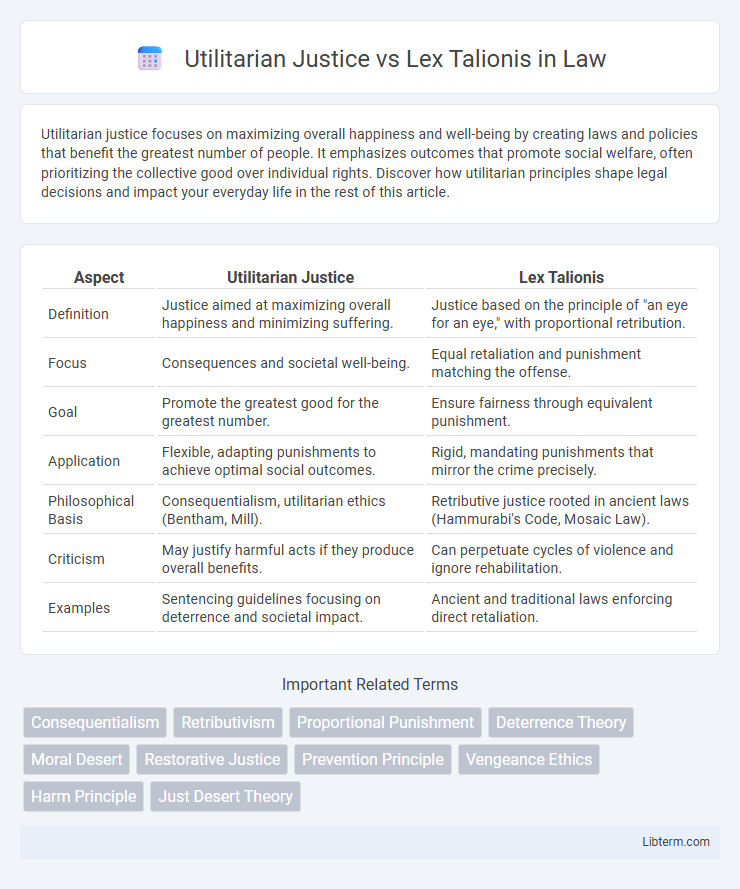Utilitarian justice focuses on maximizing overall happiness and well-being by creating laws and policies that benefit the greatest number of people. It emphasizes outcomes that promote social welfare, often prioritizing the collective good over individual rights. Discover how utilitarian principles shape legal decisions and impact your everyday life in the rest of this article.
Table of Comparison
| Aspect | Utilitarian Justice | Lex Talionis |
|---|---|---|
| Definition | Justice aimed at maximizing overall happiness and minimizing suffering. | Justice based on the principle of "an eye for an eye," with proportional retribution. |
| Focus | Consequences and societal well-being. | Equal retaliation and punishment matching the offense. |
| Goal | Promote the greatest good for the greatest number. | Ensure fairness through equivalent punishment. |
| Application | Flexible, adapting punishments to achieve optimal social outcomes. | Rigid, mandating punishments that mirror the crime precisely. |
| Philosophical Basis | Consequentialism, utilitarian ethics (Bentham, Mill). | Retributive justice rooted in ancient laws (Hammurabi's Code, Mosaic Law). |
| Criticism | May justify harmful acts if they produce overall benefits. | Can perpetuate cycles of violence and ignore rehabilitation. |
| Examples | Sentencing guidelines focusing on deterrence and societal impact. | Ancient and traditional laws enforcing direct retaliation. |
Introduction to Justice Theories
Utilitarian justice emphasizes maximizing overall happiness by promoting actions that result in the greatest good for the greatest number, prioritizing collective welfare over individual retribution. Lex Talionis, or the law of retaliation, centers on proportionate punishment, ensuring that penalties mirror offenses to uphold fairness and deter wrongdoing. These contrasting theories highlight the balance between consequentialist ethics and retributive principles within foundational justice frameworks.
Defining Utilitarian Justice
Utilitarian justice emphasizes outcomes that maximize overall happiness and minimize suffering, prioritizing the greater good over individual retribution. This ethical framework assesses laws and punishments based on their consequences for societal welfare rather than strict adherence to reciprocal justice. In contrast, Lex Talionis, or the law of retaliation, demands punishment equivalent to the offense, focusing on balanced retribution rather than social utility.
Understanding Lex Talionis
Lex Talionis, or the law of retaliation, is a principle of justice that emphasizes equal retribution, often summarized as "an eye for an eye." This concept operates on the premise that punishment should mirror the offense in severity and nature, aiming to maintain social order through proportionate consequences. Unlike utilitarian justice, which prioritizes overall societal welfare and deterrence, Lex Talionis strictly enforces reciprocal justice to uphold fairness and balance.
Historical Evolution of Justice Concepts
Utilitarian justice, rooted in the principles of maximizing overall happiness and minimizing suffering, emerged prominently during the Enlightenment with philosophers like Jeremy Bentham and John Stuart Mill advocating for laws that promote the greater good. In contrast, Lex Talionis, or the law of retaliation, originates from ancient legal codes such as the Code of Hammurabi and early Biblical texts, emphasizing retributive justice through equivalent punishment. The historical evolution from Lex Talionis to utilitarian justice reflects a significant shift from rigid reciprocal penalties toward more flexible, consequence-based legal systems designed to enhance social welfare.
Core Principles of Utilitarian Justice
Utilitarian justice centers on maximizing overall happiness and minimizing suffering by evaluating actions based on their consequences for the greatest number of people. Core principles include promoting social welfare, deterrence through effective punishment, and rehabilitation to reduce future harm. This contrasts with Lex Talionis, which emphasizes retributive justice based on proportional retaliation rather than outcome-based assessment.
Fundamental Tenets of Lex Talionis
Lex Talionis, rooted in the principle of "an eye for an eye," emphasizes retributive justice by ensuring punishments mirror the severity of the offense, maintaining proportionality and fairness in legal systems. Its fundamental tenets revolve around exact reciprocity, deterrence through equitable retaliation, and the restoration of balance between the offender and victim. This contrasts with utilitarian justice, which prioritizes maximizing overall social welfare rather than strict proportional retribution.
Comparative Analysis: Outcomes vs Retribution
Utilitarian justice prioritizes outcomes by aiming to maximize overall happiness and minimize societal harm through corrective measures, whereas Lex Talionis centers on retribution, emphasizing proportional punishment based on the principle of "an eye for an eye." Utilitarianism evaluates the effectiveness of penalties in deterring future crimes and rehabilitating offenders, while Lex Talionis upholds moral balance by ensuring that punishments mirror the offense's severity. The contrast highlights a practical focus on societal welfare against a moralistic emphasis on equivalence and fairness in justice systems.
Real-World Applications in Legal Systems
Utilitarian justice emphasizes punishment designed to maximize overall social welfare, often through deterrence, rehabilitation, or incapacitation, influencing sentencing policies like parole and restorative justice programs. Lex Talionis, or the law of retaliation, enforces a principle of proportional retribution, evident in legal systems that apply strict penalties such as "an eye for an eye" retribution or mandatory minimum sentences. Modern legal frameworks balance these approaches by integrating utilitarian principles to reduce recidivism while maintaining elements of lex talionis to ensure proportionality and public confidence in justice.
Ethical Critiques and Debates
Utilitarian justice prioritizes outcomes that maximize overall happiness but faces ethical critiques for potentially justifying harmful means to achieve beneficial ends, raising debates about the morality of sacrificing individual rights. Lex Talionis, or the law of retaliation, emphasizes proportional punishment aligned with the offense but is often criticized for perpetuating cycles of violence and lacking flexibility for context or rehabilitation. Ethical discussions contrast utilitarianism's focus on collective welfare with Lex Talionis' retributive fairness, highlighting tensions between consequentialist and deontological moral frameworks.
Conclusion: Balancing Justice Approaches
Balancing utilitarian justice and lex talionis requires integrating the goal of maximizing overall social welfare with the principle of proportional retribution. Utilitarianism emphasizes outcomes that reduce harm and promote rehabilitation, while lex talionis ensures punishment fits the crime, maintaining moral equivalence. Effective justice systems blend these approaches to uphold fairness and deterrence without sacrificing societal well-being.
Utilitarian Justice Infographic

 libterm.com
libterm.com